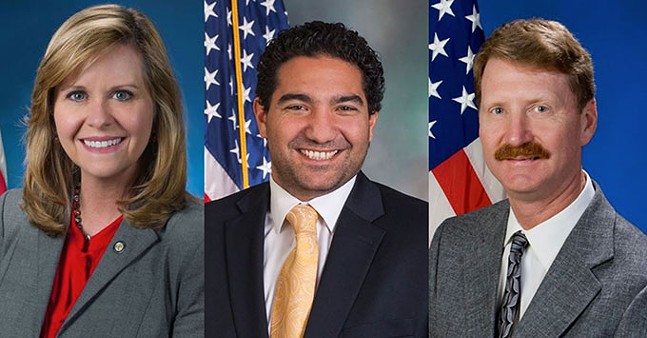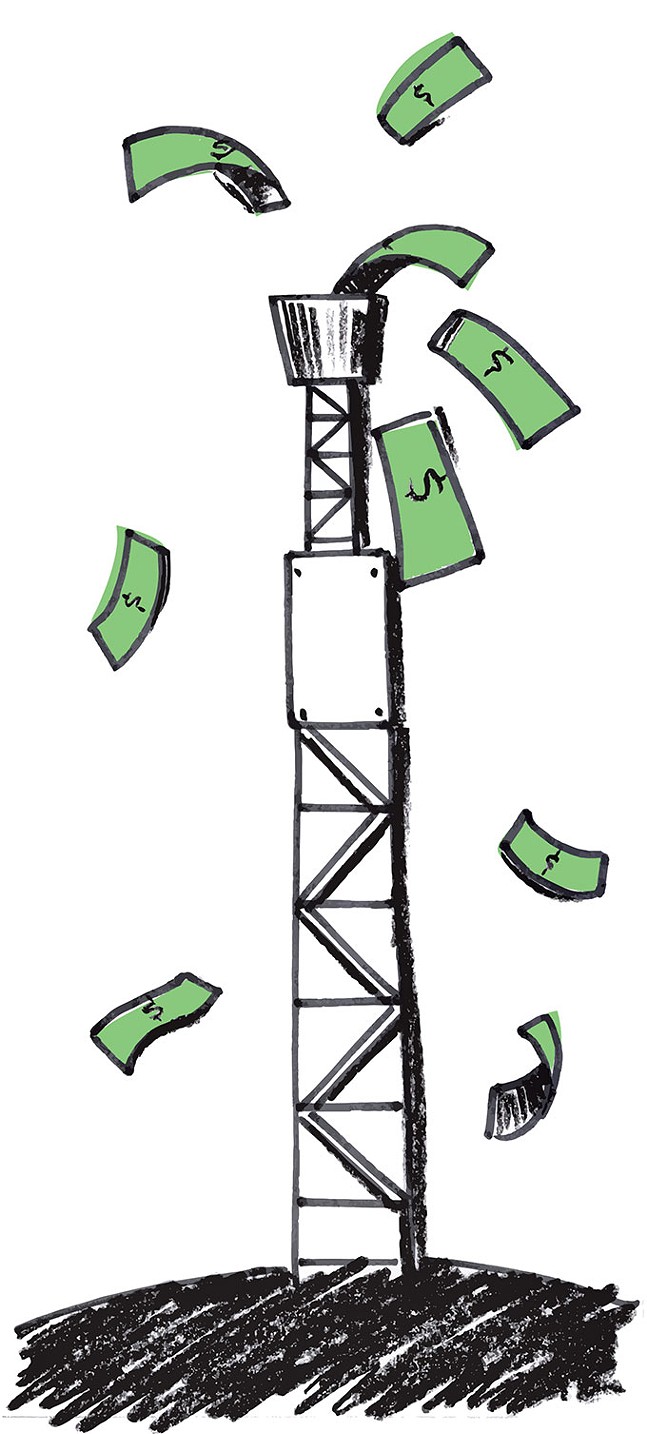Though natural-gas drilling, aka fracking, only really started in Pennsylvania about 10 years ago, it has gained a political hold on Pennsylvania that any industry would envy. Virtually all statewide elected officials in the Keystone State support fracking. Republicans do so enthusiastically, but even Democrats who are calling for better environmental regulations still defend the industry as a necessary and important source for jobs in rural areas.
Despite this widespread support, research shows that fracking has led to well-water contaminations and copious amounts of methane being spewed into the atmosphere. Additionally, the industry failed to deliver on the manufacturing jobs it promised would be created by drilling for natural gas.
Only a handful of progressive and environmentally focused politicians have come out in total opposition to fracking. And when criticism of the industry is made public, it often becomes a lightning rod, as when Pittsburgh Mayor Bill Peduto said last year that fracking should be rolled back and future petrochemical plants should be avoided. In response, Democratic Gov. Tom Wolf, Democratic Allegheny County Executive Rich Fitzgerald, and Republican House Speaker Mike Turzai condemned Peduto's statement.
Any high-profile criticism of the industry tends to provoke ardent defense from its supporters, and that goes beyond just words: some area legislators might also personally benefit financially from a more robust natural gas industry and fewer regulations keeping it accountable.
Last November, the government-accountability group Eyes on the Ties revealed that three Southwestern Pennsylvania state legislators have direct incomes related to the natural-gas industry, including one that is a part-owner of a company that supplies equipment to fracking companies. All three of them are champions of the fracking industry, and have voted to cut regulations for natural-gas drilling in the state.
State Rep. Josh Kail (R-Beaver) owns stake in his brother's fracking-related company, among other ties to the industry. State Sen. Elder Vogel (R-New Sewickley) invests in two energy companies with ties to Pittsburgh regional fracking. And state Sen. Camera Bartolotta (R-Monongahela) has leased the mineral rights of her property to natural-gas companies.
On top of that, each of their campaigns also accept large political donations from natural-gas interests.
Ned Ketyer, an environmental activist and pediatrician from Washington County, has been advocating for local legislators to take a closer look at the dangers of fracking. He says he isn’t surprised at the financial connections, and knows that the state’s conflict of interest laws don’t really prohibit this behavior. Nonetheless, he says when politicians have such close and personal ties to the industry they are supposed to be holding accountable, it leads people to lose trust in politicians
“I think that is the way politics is, and it is why people hate politics,” says Ketyer.
Kail was first elected in 2018; he serves the 15th House District, which includes parts of Beaver County and the western section of Washington County. Kail’s district is also home to an under-construction cracker plant, which will refine fracked natural-gas into plastic pellets, as well as a number of fracking wells already in operation.
Eyes on the Ties found that Kail owns a 7% stake in Revolution Energy Services, a local company that provides equipment and employees to the natural-gas drillers. Kail’s brother is the CEO of Revolution Energy Services. In financial disclosure forms, Kail also reports income from and lists himself as an employee of Silver Creek Services, a local company offering equipment and services for frackers. A Pittsburgh Business Times article from 2016 identified Kail as the company’s general counsel. According to campaign finance reports, Kail, who has only run for office once, has received more than $18,000 from oil, gas, and coal interests. Business partners at Revolution Energy Services also donated more than $6,000 to his campaign.
Kail is the prime sponsor of House Bill 1102, which is part of House Republicans' Energize PA package, which has the goal of increasing natural-gas production by cutting regulations.
Kail did not respond to a request for comment for this article.
Bartolotta was first elected in 2014 and currently co-chairs the state Senate’s Gas and Oil Caucus. She also sits on the Environmental Resources and Energy Committee, which is the first step in creating laws related to fracking. Her senate district includes all of Greene County and parts of Washington and Beaver counties. She says she entered into an agreement to lease her mineral rights under her home and grocery store to EQT prior to being elected.
“As required by law, I report those contracts annually on my statement of financial interest,” said Bartolotta in a statement to Pittsburgh City Paper. “Just because I am an elected official does not mean I lose my ability to lease my mineral rights. I am no different than a legislator who owns real estate, business or the like.”
Bartolotta says the laws that she helps pass are “critical in striking a fair and appropriate balance between protecting and preserving the Commonwealth’s natural resources as well as utilizing those resources.”
In April, Bartolotta introduced a bill that would allow natural-gas drilling to occur on state forest lands, which is currently prohibited. And in August she praised the proposal to build a natural-gas pipeline that would run through her district and transfer natural gas to the East Coast.
Like Ketyer, Karen Feridun of anti-fracking group Berks Gas Truth isn’t surprised by Pittsburgh-area legislators with financial ties to fracking companies. She has been lobbying state politicians about the health consequences of fracking, and says it has mostly gone unacknowledged. She says the state’s conflict of interest laws are too lax, and expects legislators to take advantage of that, considering the strong relationships fracking companies have established with legislators.
“We have terrible conflict of interest rules,” says Feridun. “It goes far beyond what many would expect. They are natural-gas lease holders and they directly benefit. Nothing seems to stop them. As long as they file their forms and as long as they don’t benefit more than the general public, then it is fine.”
According to the state constitution, it’s legal for state legislators to vote on bills that could affect their outside financial interests, as long as legislators don’t derive any extra or special benefit from the legislation in question.
Ketyer understands that it can be difficult for all politicians to tease out all personal investments tied to the oil-and-gas industry.
But he says many state legislators aren’t currently equipped to understand the science showing the negative health effects related to fracking, and that the pro-fracking biases that are forming only make that harder.
“There is a lot of peer reviewed scientific evidence and medical evidence showing significant harms to workers and people living near fracked gas wells,” says Ketyer. “The evidence has been overwhelming.”
According to a study from the Oxford Research Encyclopedia of Global Public Health, fracking has been linked to asthma, fatigue, high-risk pregnancies, migraines, and skin disorders. Pennsylvania's Department of Environmental Protection has identified 350 cases where water supplies were impacted by the oil and gas industries. There are more than 10,000 active fracking wells in the state. Recently, lobbying from Ketyer and Berks Gas Truth helped to get the state government to open an investigation into a string of rare cancers that have proliferated in Canonsburg, which is home to several fracking wells.
Vogel entered office in 2009 and serves the senate district covering parts of Beaver, Butler, and Lawrence counties. According to Eyes on the Ties, Vogel’s most recent financial disclosure shows that he gets “direct or indirect sources of income” from Penn Energy, a natural-gas acquisition and development company based in Pittsburgh, and ETC Northeast Pipeline LLC, which is based in Texas, but owns and operates natural-gas pipelines in Pennsylvania. According to the Pittsburgh Post-Gazette, he also holds a gas lease on part of his family’s farm.
Vogel, like Bartolotta, sits on Environmental Resources and Energy Committee. Since 2007, he has received more than $40,000 in campaign contributions from the natural-gas industry. Vogel defends his investments with the natural-gas companies, and says the state’s ethics laws ensure that legislators don’t forgo the rights that other residents have, as long as they are transparent.
“As the Commonwealth’s ethics law lays out, you can be part of a class of individuals in similar situations,” said Vogel in a statement. “I am not different in terms of the family farm having a lease than the other individuals who also have a lease.”
Last week, Vogel voted in favor to advance a bill out of committee that would reduce regulations on fracking and provide tax credits to natural-gas related businesses.
Feridun says all the support, all the direct economic ties to the natural gas industry just show how far state politicians have gone to defend the fracking industry, and wonders how much Pennsylvania politicians are going to instigate fracking-related laws, when they are committed on a political and a personal level.
“If you are investing in something you want it to do well,” says Feridun. “It is indicative of a mindset that you are obviously invested in, even if it’s not a huge financial boon. It shows that they have no qualms. It sort of normalizes the whole thing.”
She says stories like these are evidence of the political power fracking has garnered over the last decade.
“I think that it has a lot to with the fact that in Pennsylvania there is only one party: the fossil fuel party,” says Feridun. “And we are not invited.”
















